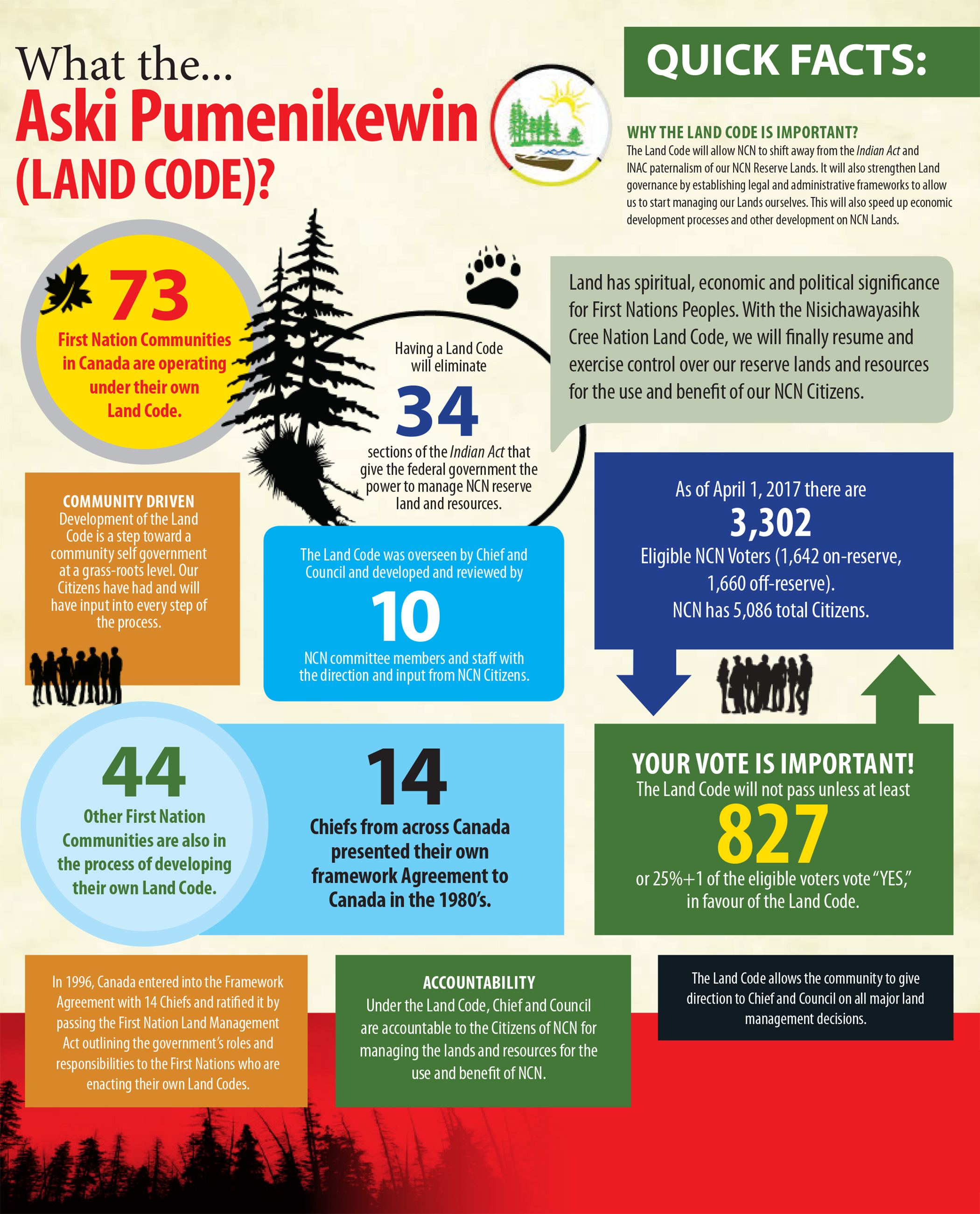NCN LAND CODE DEVELOPMENT
NCN is developing a NCN Aski Pumenikewin (Land Code) under the First Nation Land Management Framework Agreement. The Land Code development stage is a process that involves:
- Drafting a Land Code with community Land Code Committee
- Negotiating an Individual Transfer Agreement with Canada
- Conducting a community ratification vote
The developmental stage includes input directly from community members through community engagement (eg. workshops, information sessions, committee meetings, newsletters, focus groups, etc.).
This important initiative is being co-ordinated with discussions about the Constitution as both provide NCN with mechanisms to pass laws. The draft Land Code will be discussed with the community over the next few months – leading up to a vote.
NCN will need Citizens to participate in Land Code public meetings and vote yes on the NCN Aski Pumenikewin (land code) to pave the way for further advancement for the Nation.
NCN LAND CODE DEVELOPMENT COMMITTEE MEMBERS
- Bill Yetman, Chair
- Darcy Linklater
- Roslyn Moore
- Willie Moore
- Ron Spence
- Greg Tayes
- Cheyenne Colomb
- Colleen Hunter
- Jeremiah Spence, Coordinator
WHY THE LAND CODE IS IMPORTANT?
The Land Code will allow NCN to shift away from the Indian Act and Aboriginal Affairs and Northern Development Canada (AANDC) paternalism of our NCN Reserve Lands. It will also Strengthen Land Governance by establishing legal and administrative frameworks to allow us to start managing our Lands ourselves. This will also speed up economic development processes and other development on NCN Lands.
INDIAN ACT vs. LAND CODE
| INDIAN ACT | LAND CODE |
|---|---|
| The Indian Act is written and interpreted by Canada. | The NCN Land code is developed ad drafted by NCN for NCN. |
| The Indian Act is one size fits all. | The NCN Land code is unique to NCN. |
| The Indian Act can only be amended by Canada. | The NCN Land Code can be amended by a vote of NCN Citizens. |
| The Indian Act authorizes the Minister of Indigenous and Northern Affairs Canada to have sole discretion and decision-making. | Chief and Council and NCN Citizens are in the driver’s seat regarding decision-making processes. |
| The Indian Act can be amended/changed without our consent. | The Acts that support our Land Code cannot be amended/changed without NCN consent. |
| NCN is not a “government”; we are instead considered a “ward”, “Ministerial Delegate” and “administrator” with no law making authority. We can only make legal decisions or bylaws that Canada approves of and not all are enforceable. | NCN would be recognized as “government” with real legislative authority and our laws will be enforceable in court. Canada has no authority to overrule or cancel our duly made land laws or decisions. |
| We have the authority to make certain managerial decisions and make certain bylaws. | We have the authority to make, administer and enforce land laws and manage our reserve lands and resources. |
| Indian Act laws, policies, procedures, rules and legal documents are made by Canada and we must follow them. | Land laws, policies, procedures, rules and legal documents are all developed, approved, and enacted by NCN according to our Land Code, language, and culture. |
| We are not authorized to be in lawful possession of land unless the Minister approves it. This also includes Land transfers. | We can create and authorize different types of legal land interests. |
| There is no environmental Assessment of Protection Laws for our land unless there is an agreement by Canada. Enforcement, monitoring, testing, and compliance can be a problem. | We can create and enact our own Environmental Assessment/Protection Laws. |
| We are accountable by reporting to Canada only and there are no conflict of interest policies. | We are accountable by reporting to the NCN Citizenship and having conflict of interest policies. |
| Members do not have a clear role in certain decisions and they do not have the right to receive or access information. | Members have a clear role in decision-making, approvals and access to information. |
| There is no process to solve disputes. | We can solve disputes by having our own Dispute Resolution Panel composed of NCN Citizens. |
| Expropriation is possible without our consent by federal or provincial governments for the purpose of Crown corporations or municipalities. | There will be no expropriation by provincial or municipal agencies and only extremely limited federal expropriation (in cases of emergency). |
| The current government Lands Registry is policy based and does not guarantee land certainty because it is overly bureaucratic with lengthy approval times (6 to 12 months). | We will have and will be able to manage our own NCN Lands Registry. |
| Our legal status/capacity is unclear and uncertain so it discourages lenders and other financial partners. | We will have recognized legal status/capacity to acquire and hold property, to borrow and contract, to expend and invest money and to be a party to legal proceedings. |
BENEFITS OF A LAND CODE
A Land Code has many benefits for more than just lands development:
- Reclaiming the responsibility of OUR Lands and Natural Resources that the Indian Act took away from us.
- Protecting Reserve lands for future generations as Nisichawayasihk sees fit.
- Becoming self-sufficient in the governance and management of NCN Lands and Resources.
- Important decisions regarding OUR Lands and Natural Resources will be in the hands of NCN CITIZENS instead of the Government of Canada, Minister of Indian Affairs and Bureaucrats.
- Inclusion of both off-reserve and on-reserve members in important decision making.
- Recognition of significant law-making powers respecting NCN Lands.
- Removal of the need to obtain Ministerial approval for NCN Land & Environmental Laws.
- Recognition on Canadian courts of NCN Land & Environmental Laws.
- Establishment of a legal land registry system.
- Timely business and administrative decisions will result in accelerating our Economic Development.
- NCN will have the opportunity for increased environmental protection of OUR Lands.
A Land Code does NOT:
- Affect the current tax exemption of reserve lands and property situated on-reserve,
- Create “Fee Simple” land or any other type of alienable land interest,
- Turn us into a municipality,
- Affect Treaty or any other defined or undefined Aboriginal Rights,
- Affect additions to reserves, or
- Affect land claims.
LAND CODE QUICK FACTS

